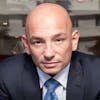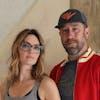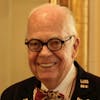Marketing Is A Chance To Innovate, Test & Win - Sam Trotter, The Indigo Road Hospitality Group

What if marketing is more than just advertising - and it's a chance to learn, try new things, and ultimately succeed as a hospitality provider?
Today, we're learning from Sam Trotter, head of digital marketing at The Indigo Road Hospitality Group about the big opportunity with marketing that applies even if you don't work in this area!
Join in the conversation on this episode on the Hospitality Daily LinkedIn page here.
This episode is brought to you with support from Sojern. Finding and appealing to travelers online means getting to know them, and that's why first-party data - the information you have about your guests - is so important to providing hospitality today. I teamed up with Sojern to study how hoteliers are using this data to drive revenue and build stronger guest relationships, and you can see what we found in this research report: How Hotel Brands Are Using First-Party Data to Drive Revenue & Build Stronger.
Josiah What if marketing is more than just advertising, and it's a chance to learn, try new things, and ultimately succeed as a hospitality provider? I started thinking about this after speaking with Lauren Phelps, who told me about how she used digital marketing to open a new hotel in the heart of Silicon Valley successfully.
Lauren Where you have the most flexibility in understanding your product-market fit as a hotel is in the marketing. You can adapt your keywords 30 times a day and you can see what hits. Our restaurant is called Roger and we had a whole set of meetings called Who is Roger? And it was just various experiments we ran about marketing the restaurant and we thought it would appeal to this segment. It actually turned out that locals in Mountain View and in the neighborhood we were located where they skewed slightly older. We came in with a full, touchless, contactless technology stack and the restaurant wasn't what the customer wanted.
Josiah Today we're learning from Sam Trotter, head of digital marketing at The Indigo Road Hospitality Group, about the big opportunity with marketing that frankly applies even if you don't work in this area.
Sam One of the quotables that I always say is there's no such thing as an expert marketer. You always have to be constantly learning. We just learned about TikTok in the last couple of years. And so that's all of a sudden something that you have to think about and learn about. download it on your phone and experience it no matter how much of a curmudgeon you want to be and not participate. You have to actually do it. So somebody was asking me about Snapchat recently. So I had to go back and open it up and see how it was being used. And I just, I don't know, I like being a constant student of the business and what you can do.
Josiah I want to ask you about something because I was talking to Lauren Phelps, who opened a new hotel here in the San Francisco Bay Area. And she said what was interesting for her was to use marketing tactics to help develop that concept. And I'm curious for you, your business is growing quickly, you're opening all these new outlets. Is this approach to experimentation something that has benefits beyond just marketing campaigns? Are you at all able to kind of understand audiences or offerings in a way that benefits other teams or the business as a whole?
Sam Yeah, I believe that your business has a framework. And for most hotels, it's pretty similar, right? The framework means you do X number of activities, and they produce Y number of results. And so you need to focus on these activities to generate the results that you need them to, right? Obviously, frameworks are different. If you're a convention hotel, for example, your framework is going to be different than if you're in a super leisure market. Cool, it's my key boutique hotel. But I sort of believe in these frameworks. And I think the part you can play with is that little extra bit. So figuring out, okay, we're soft in this period, we could be doing better, like how can we better position ourselves in the market? And so when you're throwing out ideas, I think that they're sort of in addition to, not instead of. So I don't really know if that answers your question, but I really think experimentation helps evolve your brand and to do cool things and improve your business. So a dumb example of that would be you have a restaurant and you have a concept and it's a great brand. It's doing well. On Wednesday nights, you're really soft. between the hours of five and six. And so you put together a really unique happy hour or you focus on French roses or something and do a discount on those. And then you mark that out to sort of improve your business. That's the sort of experimentation that adds to your brand and improves your business. That's kind of how I think about it.
Josiah I think it's a good example because this is where hospitality marketing is so interesting and exciting because there's this real physical component to it. It's not just e-commerce or selling digital products or software where it's all instant. You have to work with your operations team in your example to roll out this happy hour. You're getting feedback. And so it's more holistic. You have to think kind of broadly about this. But it's got to be fun to play around with those different concepts. And if I look at the growth of your company, it's clear that it's working for you.
Sam Absolutely. Yeah, it is very fun. And you never know what's going to hit and what's not. We are doing a Julia Childs-themed dinner in September at one of our mountain resorts. And we're just sort of putting that together. And it's a lot of work putting stuff together.
Josiah Who do you get involved? Because I think sometimes people don't know, like, is it you and your team? Or when you come up with a new kind of offering like this? Maybe let's use this example. Like who are you bringing to the table? And how does that come to be?
Sam So it depends on your situation. I love it when you have a really creative PR agency, and they help you come up with ideas and concepts. And they come to the table with some unique perspectives. And so you kind of listen to what they have to say, and you distill it down. Okay, so what makes sense for us, what's on brand, what isn't on brand, what team do we have in place to be able to execute? So you take it, you distill it down, and then you bring it up to your operations teams. So we try to have a regular conversation with them, and we'll talk about ideas that we have. So it's mostly a PR, marketing, and operations thing. And our founder, Steve, he's sometimes involved, you know, we'll talk to him, what he thinks about the concept and pricing. And so, you know, we'll involve leadership at times. But yeah, we are working with our PR agencies and our operations teams, because without them, I mean, we can't do anything. So they have to believe in it. We might have to sell it sometimes.
Josiah I am curious in terms of like, because there's the operational, just feasibility, right? Like, can we do this? But how do you, I guess, feel out if this will actually be something guests enjoy? Because I think this is a tension within marketing in hospitality where I was talking to someone the other day where it's like, okay, yeah, we could create, get media coverage if we had a gold-dusted burger that we sold for $5,000. But it's unclear if guests actually like it. And how do you balance that need to raise awareness and get attention with actually having something that guests are going to want and enjoy?
Sam If I had the answer to that, I would be like a billionaire, right? So you don't know. You have events that you have done in the past and you've seen if they were successful or not. We have data on how the emails performed and we have data on how the event actually performed. And then we hear from the operations teams, how it went. We talked about it after the fact, was it profitable? We know if we received press from it. So there are a lot of indicators for us. We're doing a hot air balloon package where we're literally tethering the hot air balloon to our patio. The idea is that it's going to be peak fall foliage and so you go up in this balloon and you're in the mountains and you can see the beautiful fall foliage all around you. Do we know if it's going to be a winner? We don't. But it is a really cool experience that we think our guests would really be excited about. And we hope it is a profitable thing. And we believe in it. And we're going to market it as best as we can. But ultimately, at the end of the day, we all have to stick our necks out there a little bit. And that's kind of what being in boutique hotels is all about. You know, if I opened a Hampton Inn, I just do my Hampton Inn thing. It's Christmas Day. It's the same breakfast spread, right? But we have a brand and we strive to deliver this really cool experience for our guests. And we want to take them on an experience. And so we're going to go for it, man.
Josiah Well, I love that. And if you decide to work in boutique hospitality, there's an opportunity, but there's tension as well. And I think I just want to kind of make sure that our listeners don't miss this because what you mentioned is a piece that I don't see everybody doing is looking at the whole picture. So you're looking at the marketing analytics, but it's also the operational feedback. You're looking at the revenue performance. Was this good for everybody? It wasn't just the $5,000 burger that was going to get me a media mention. It seems that you're looking, this is actually driving our business forward. But in the hot air balloon example, I think that's another good example where it's like you're pushing the envelope, you're trying new things, but it seems cool. You don't know exactly how it's going to pan out, but you're trying these things that feel cool versus I love burgers, but a $5,000 burger does not get me excited. So I think it's kind of like making bold bets in the direction of what you think is going to be the sort of organization or the sort of experience that you want, right?
Sam Exactly, exactly. You have this experience that you picture people wanting to have. And that's why you go on vacation to have an experience. And for whatever reason, they chose you to be their guide. Hopefully, it's not just because of price, but it's because the brand that you've created really speaks to them in a way that the other ones didn't. In everything we do, we hope to embody that brand. And we think that if we are strong enough in our brand, then we'll attract the people that will enjoy it the most. And so hopefully they'll love it and they'll come back every year. And maybe the balloon thing is something that we've been doing for 12 years and it's a family thing. And they're coming back every year with their family to do the balloon ride. But yeah, you know, that's why I think boutique hotels are so fun.

Samuel Trotter
Head of Digital Marketing
Sam Trotter is a team first leader at The Indigo Road where he leads Digital Marketing efforts for the fast growing Hospitality Group. Since joining the team, The Indigo Road has since undergone the development of an innovative marketing platform that drove record revenue and profits. Improved inter-team communication that boosted efficiency, while press recognition from esteemed publications like Conde Nast, Travel + Leisure, FSR Magazine, has elevated the brand's reputation. Additionally, brand-new, cutting-edge websites enhanced the overall customer experience.
His journey in the hospitality industry began back in 2006 when he opened a Conde Nast "Hot List" boutique resort in South Beach. Since then, Sam's expertise has taken him to hotels and restaurants in major cities like Atlanta, San Francisco, and London, as well as smaller markets like Provincetown, MA, Charleston, SC, Asheville, NC, Dominica, and Bocas Del Toro, Panama.
One of his notable achievements was leading Charlestowne Hotels' portfolio of hotels, driving a staggering 75% of their business through direct bookings. After that, he became the VP of Marketing for a significant $750 million mixed-use development, overseeing 500,000 square feet of residential and commercial space. This ambitious project comprised 18 F&B concepts, ranging from fine dining to a food hall, along with a boutique hotel, co-work spaces, health & beauty spa, retail outlets, fitness club, and more.
Sam is not only a marketing expert but also a sought-after speaker at industry … Read More
Most Popular Episodes
Check these out:


























